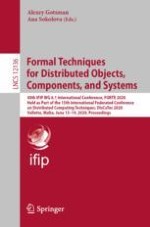2020 | Buch
Formal Techniques for Distributed Objects, Components, and Systems
40th IFIP WG 6.1 International Conference, FORTE 2020, Held as Part of the 15th International Federated Conference on Distributed Computing Techniques, DisCoTec 2020, Valletta, Malta, June 15–19, 2020, Proceedings
herausgegeben von: Alexey Gotsman, Ana Sokolova
Verlag: Springer International Publishing
Buchreihe : Lecture Notes in Computer Science
